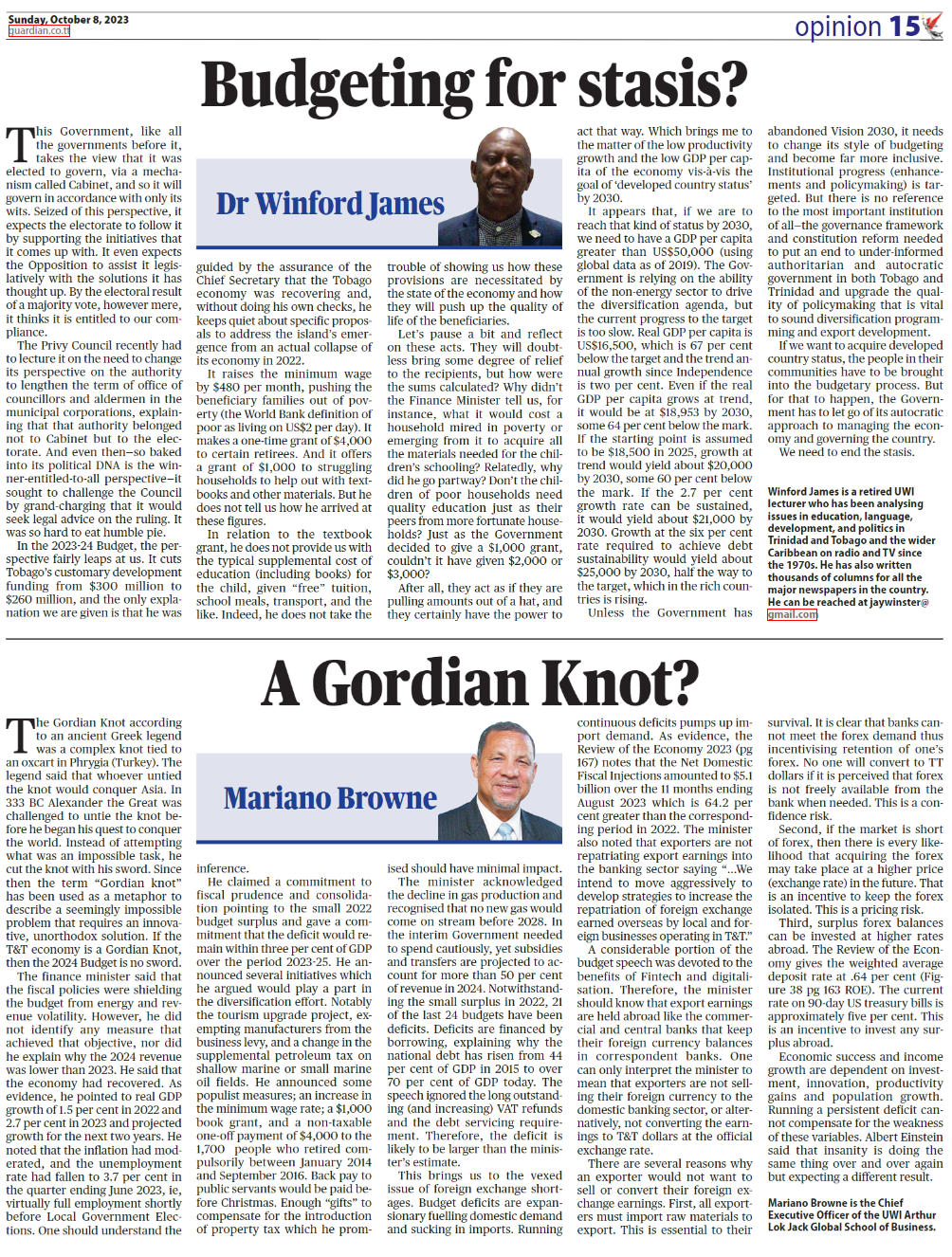A Gordian Knot?
T he Gordian Knot according to an ancient Greek legend was a complex
knot tied to an oxcart in Phrygia (Turkey). The legend said that whoever
untied the knot would conquer Asia. In 333 BC Alexander the Great was
challenged to untie the knot before he began his quest to conquer the
world. Instead of attempting what was an impossible task, he cut the knot
with his sword. Since then the term “Gordian knot” has been used as a
metaphor to describe a seemingly impossible problem that requires an
innovative, unorthodox solution. If the T&T economy is a Gordian Knot,
then the 2024 Budget is no sword.
The finance minister said that the fiscal policies were shielding the budget
from energy and revenue volatility. However, he did not identify any
measure that achieved that objective, nor did he explain why the 2024
revenue was lower than 2023. He said that the economy had recovered. As
evidence, he pointed to real GDP growth of 1.5 per cent in 2022 and 2.7 per
cent in 2023 and projected growth for the next two years. He noted that
the inflation had moderated, and the unemployment rate had fallen to 3.7
per cent in the quarter ending June 2023, ie, virtually full employment shortly before Local Government Elections.
One should understand the inference.
He claimed a commitment to fiscal prudence and consolidation pointing to
the small 2022 budget surplus and gave a commitment that the deficit
would remain within three per cent of GDP over the period 2023-25. He
announced several initiatives which he argued would play a part in the
diversification effort. Notably the tourism upgrade project, exempting
manufacturers from the business levy, and a change in the supplemental
petroleum tax on shallow marine or small marine oil fields. He announced
some populist measures; an increase in the minimum wage rate; a $1,000
book grant, and a non-taxable one-off payment of $4,000 to the 1,700
people who retired compulsorily between January 2014 and September
2016. Back pay to public servants would be paid before Christmas. Enough
“gifts” to compensate for the introduction of property tax which he
promised should have minimal impact.
The minister acknowledged the decline in gas production and recognised
that no new gas would come on stream before 2028. In the interim
Government needed to spend cautiously, yet subsidies and transfers are
projected to account for more than 50 per cent of revenue in 2024.
Notwithstanding the small surplus in 2022, 21 of the last 24 budgets have
been deficits. Deficits are financed by borrowing, explaining why the
national debt has risen from 44 per cent of GDP in 2015 to over 70 per cent
of GDP today. The speech ignored the long outstanding (and increasing)
VAT refunds and the debt servicing requirement.
Therefore, the deficit is likely to be larger than the minister’s estimate.
This brings us to the vexed issue of foreign exchange shortages.
Budget deficits are expansionary fuelling domestic demand and sucking in
imports. Running continuous deficits pumps up import demand. As
evidence, the Review of the Economy 2023 (pg 167) notes that the Net
Domestic Fiscal Injections amounted to $5.1 billion over the 11 months
ending August 2023 which is 64.2 per cent greater than the corresponding
period in 2022. The minister also noted that exporters are not repatriating
export earnings into the banking sector saying “…We intend to move
aggressively to develop strategies to increase the repatriation of foreign
exchange earned overseas by local and foreign businesses operating in
T&T.”
A considerable portion of the budget speech was devoted to the benefits of Fintech and digitalisation.
Therefore, the minister should know that export earnings are held abroad
like the commercial and central banks that keep their foreign currency
balances in correspondent banks. One can only interpret the minister to
mean that exporters are not selling their foreign currency to the domestic
banking sector, or alternatively, not converting the earnings to T&T dollars
at the official exchange rate.
There are several reasons why an exporter would not want to sell or
convert their foreign exchange earnings. First, all exporters must import
raw materials to export. This is essential to their survival. It is clear that
banks cannot meet the forex demand thus incentivising retention of one’s
forex. No one will convert to TT dollars if it is perceived that forex is not
freely available from the bank when needed. This is a confidence risk.
Second, if the market is short of forex, then there is every likelihood that
acquiring the forex may take place at a higher price (exchange rate) in the
future. That is an incentive to keep the forex isolated. This is a pricing risk.
Third, surplus forex balances can be invested at higher rates abroad. The
Review of the Economy gives the weighted average deposit rate at .64 per
cent (Figure 38 pg 163 ROE). The current rate on 90-day US treasury bills is
approximately five per cent. This is an incentive to invest any surplus
abroad.
Economic success and income growth are dependent on investment,
innovation, productivity gains and population growth.
Running a persistent deficit cannot compensate for the weakness of these
variables. Albert Einstein said that insanity is doing the same thing over
and over again but expecting a different result.
Mariano Browne is the Chief Executive Officer of the UWI Arthur Lok Jack
Global School of Business.

